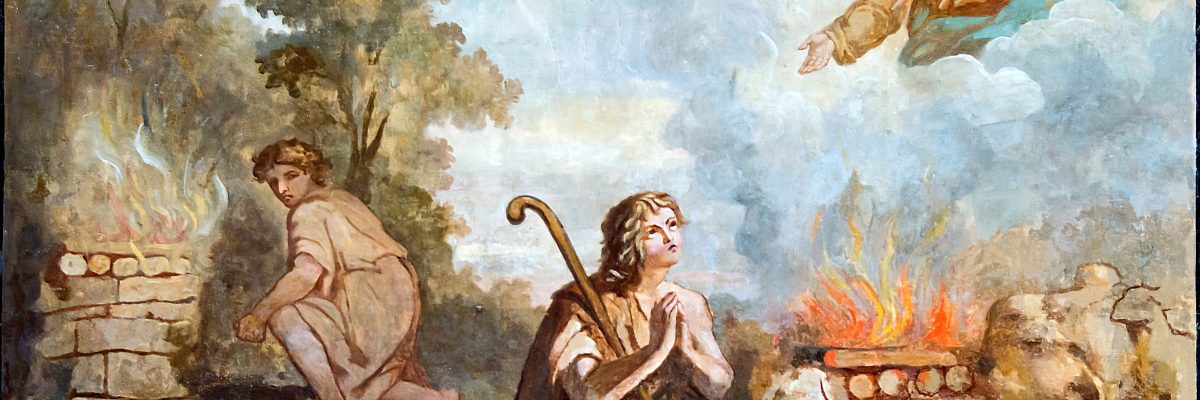
Question:
Answer:
Sacrifice and offering you do not desire; but you have given me an open ear. Burnt offering and sin offering you have not required (Psalm 40:6).
Augustine of Hippo:
12. “Sacrifice and offering Thou didst not desire” (ver. 6), saith the Psalm to God. For the men of old time, when as yet the true Sacrifice, which is known to the faithful, was foreshown in figures, used to celebrate rites that were figures of the reality that was to be hereafter; many of them understanding their meaning; but more of them in ignorance of it. For the Prophets and the holy Patriarchs understood what they were celebrating; but the rest of the “stiff-necked people” were so carnal, that what was done by them was but to symbolize the things that were to come afterwards; and it came to pass, when that first sacrifice was abolished; when the burnt-offerings of “rams, of goats, and of calves,” and of other victims, had been abolished, “God did not desire them.” Why did God not desire them? And why did He at the first desire them? Because all those things were, as it were, the words of a person making a promise; and the expressions conveying a promise, when the thing that they promise is come, are no longer uttered.… Those sacrifices then, as being but expressions of a promise, have been abrogated. What is that which has been given as its fulfilment? That “Body;” which ye know; which ye do not all of you know; which, of you who do know it, I pray God all may not know it unto condemnation. Observe the time when it was said; for the person is Christ our Lord, speaking at one time for His members, at another in His own person. “Sacrifice and offering,” said He, “Thou didst not desire.” What then? Are we left at this present time without a sacrifice? God forbid!
“But a Body hast Thou perfected for me.” It was for this reason that Thou didst not desire the others; that Thou mightest “perfect” this; before Thou “perfectedst” this, Thou didst desire the others. The fulfilment of the promise has done away with the words that express the promise. For if they still hold out a promise, that which was promised is not yet fulfilled. This was promised by certain signs; the signs that convey the promise are done away; because the Substance that was promised is come. We are in this “Body.” We are partakers of this “Body.” We know that which we ourselves receive; and ye who know it not yet, will know it bye and bye; and when ye come to know it, I pray ye may not receive it unto condemnation.2 “For he that eateth and drinketh unworthily, eateth and drinketh damnation unto himself.” “A Body” hath been “perfected” for us; let us be made perfect in the Body.
13. “Burnt-offerings also for sin hast Thou not required.” “Then said I, Lo, I come!” (ver. 7). It is time that what “was promised should come;” because the signs, by means of which they were promised, have been put away. And indeed, Brethren, observe these put away; those fulfilled. Let the Jewish nation at this time show me their priest, if they can! Where are their sacrifices? They are brought to an end; they are put away now. Should we at that time have rejected them?5 We do reject them now; because, if you chose to celebrate them now, it were unseasonable; unfitting at the time; incongruous. You are still making promises; I have already received! There has remained to them a certain thing for them to celebrate; that they might not remain altogether without a sign.… In such a case then are they; like Cain with his mark. The sacrifices, however, which used to be performed there, have been put away; and that which remained unto them for a sign like that of Cain, hath by this time been fulfilled; and they know it not. They slay the Lamb; they eat the unleavened bread. “Christ has been sacrificed for us, as our Passover.”7 Lo, in the sacrifice of Christ, I recognise the Lamb that was slain! What of the unleavened bread? “Therefore,” says he, “let us keep the feast; not with old leaven, neither with the leaven of wickedness” (he shows what is meant by “old;” it is “stale” flour; it is sour), “but in the unleavened bread of sincerity and truth.” They have continued in the shade; they cannot abide the Sun of Glory. We are already in the light of day. We have “the Body” of Christ, we have the Blood of Christ. If we have a new life, let us “sing a new song, even a hymn unto our God.”9 “Burnt offerings for sin Thou didst not desire. Then said I, Lo, I come!”[1]
[1] Augustine of Hippo. (1888). Expositions on the Book of Psalms. In P. Schaff (Ed.), A. C. Coxe (Trans.), Saint Augustin: Expositions on the Book of Psalms (Vol. 8, pp. 123–124). New York: Christian Literature Company.


